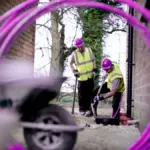Whether you’re watching the big game, having a family movie night or working from home, it’s frustrating when the weather interrupts your internet connection. Depending on your connection type, the elements can cause slower internet speeds or even a total outage. Learn more about how weather affects your internet and how to prepare so you can stay online without pesky interruptions.
(Note: These tips are only for an internet outage. If a storm knocks your home’s power out, these tips will not help you reestablish your internet connection.)
Snow, Ice and Cold Weather
Although the winter season can bring a beautiful winter wonderland, snow, ice and freezing temperatures can damage network equipment and prevent the internet from reaching the home.
How It Affects Internet
When temperatures drop below 32℉, traditional cables freeze and become brittle and stiff. This makes the cables susceptible to breaking, cracking, slowing, or completely blocking your internet connection. For satellite customers, snow is particularly problematic as the dish is shaped perfectly for collecting large amounts of snow that interfere with the signal. Freezing rain and ice coat cables and antennas, causing degraded performance or a total blockage. Cold air also affects the efficiency of the transmission of radio frequencies, causing wireless signals to scatter and leading to service disruptions. Fiber internet is designed to withstand frigid temperatures and is only impacted if a deep frost penetrates far into the ground.
How to Prepare
New weather-resistant equipment from your internet service provider can help mitigate challenges caused by winter weather, and they can perform regular maintenance of your equipment to prevent wear and tear of cables and replace damaged lines. If you have satellite internet, it’s best to prevent snow accumulation with a dish cover or heater.

Extreme Heat
With any electrical device, exposure to extreme heat can temporarily degrade performance or cause permanent damage. Exercise caution when handling overheated equipment.
How It Affects Internet
The main concern with high temperatures is overheating equipment, such as routers and modems. Overheating can cause intermittent connectivity issues or total hardware failure. In regions with intense direct sunlight, solar radiation interferes with satellite signals, causing service disruptions. During heat waves, many people stay indoors and use the internet more frequently. The surge of network traffic can strain network resources that slow internet speeds or, in extreme cases, impact data centers that require efficient cooling systems. Fiber optic lines are designed to hold up to extreme cold and hot temperatures, so the chances of your service being interrupted are slim.
How to Prepare
Heat-resistant equipment and optimized cooling systems can ensure your connection is stable during periods of extreme temperatures. If you notice your modem or router getting too hot, safely move it to a cooler location in your home or shut down your equipment to avoid permanently damaging electronic components.

Rain & Storms
In most cases, a typical rainstorm won’t affect your connection. Having newer equipment can help if you do find that your internet slows on rainy days.
How It Affects Internet
A typical rain shower won’t impact all types of internet connections. Heavy rain weakens satellite internet signals due to interference between the satellite in space and your dish. DSL and cable are typically unaffected by rain, but the radio transmissions can be interrupted if cloud cover or rain droplets and the signal frequency match up just right. Fiber optic cables are not affected by rain since data is transmitted through light signals rather than electrical signals, and water does not interfere with light transmission.
How to Prepare
Modern equipment and networks from internet service providers are designed to handle moderate rain without interrupting the signal. Replacing outdated equipment will minimize rain’s impact on your connectivity.

Hurricanes & High Winds
Major storms or high winds can damage power lines, cables and other internet equipment, which may knock out your internet connection. In these cases, it may take time for providers to repair the damage and restore your connection. Ensure you have a plan B in the event of an internet outage.
How It Affects Internet
Strong winds can damage overhead cable lines directly or by causing trees and debris to fall on the lines. Structural damage to towers and antennas can knock out communication for extended periods following a major storm. During high winds, a satellite dish can be pushed out of alignment, causing service disruptions. Rain alone won’t interrupt fiber internet, but strong winds may damage the glass fiber optic cables, causing a slower internet speed. While many communication facilities have backup power systems, they’re not indestructible. Failure of these systems can also cause service interruptions long after a hurricane has passed.
How to Prepare
Much of the responsibility to prepare for a major storm falls on the internet service provider. Your provider should ensure their infrastructure can withstand extreme winds and have a plan to restore service safely once the weather clears.
Since power outages are common in these situations, it’s important to have alternative ways to monitor weather stations and potential evacuation orders that don’t require the internet, such as battery-operated radios.

What Should I Do if My Internet Is Affected by Weather?
Do’s
- Check for Service Outages: Call your internet provider’s customer support team to see if outages are reported in your area for a real-time update on service status.
- Reboot Your Modem and Router: Unplugging your modem and router from the power source, waiting 30 seconds and plugging them back in refreshes the connection and may resolve any temporary issues.
- Inspect Cables and Connections: Ensure all cables connected to your modem, router and other devices are secure and check for damage. If you notice any fraying or other damage to the wires, call your internet service provider for replacements.
- Consider a Backup Internet Option: Install a mobile hotspot or second internet service provider for an alternative source of connectivity during outages.
Don’ts
- Attempt DIY Repairs: If you aren’t properly trained, repairing internet infrastructure yourself could damage your equipment and pose a safety hazard.
- Ignore Safety: Avoid going outside in dangerous storms or conditions to check equipment. If there is a risk of lightning, unplug electronic devices to avoid damage during a power surge.
- Adjust Outdoor Equipment: If you have outdoor equipment, such as antennas or satellite dishes, it can be dangerous to inspect them during a storm. If snow on your satellite dish is causing connectivity issues, grab a broom or long stick to brush snow off and never climb on your roof.
Weatherproof Your Digital Life with Fiber Internet
Tired of internet connectivity issues every time the wind seems to blow in the wrong direction? With fiber internet from Lumos, inclement weather like rain or lightning won’t slow down your internet. While poor weather can impact cable’s electrical signals, fiber internet uses light signals to send data and works in nearly all weather conditions.
Explore our plans and call us today at 844.844.2970 to discover how fiber internet from Lumos can enhance your online experience, rain or shine.


